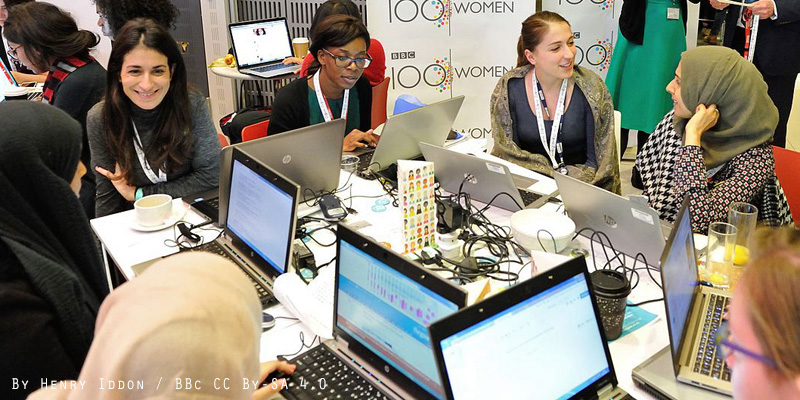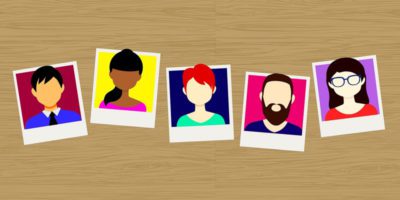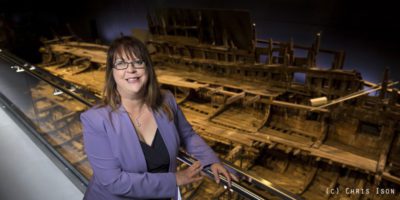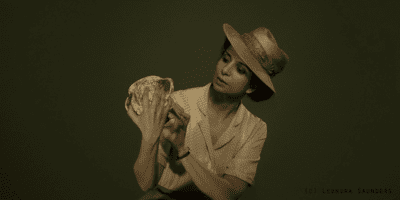Lucy Crompton-Reid, is chief executive of Wikimedia UK, having previously been director of the national live literature charity, Apples and Snakes. Her roles before this include being Head of Outreach at the House of Lords, where she led strategic and operational education and outreach activities, and at Arts Council England and the Refugee Council. Lucy is passionate about education and learning and is deeply committed to ensuring open access to knowledge and information.
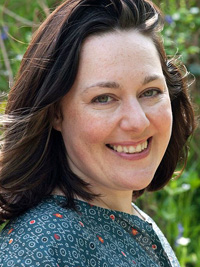
“…I would encourage Womanthology readers to think about becoming a Wikipedia editor themselves…”
My career to date
I have a career in the cultural, voluntary and public sectors spanning two decades, with a strong emphasis on leading and developing participatory practice and promoting marginalised voices. Prior to joining Wikimedia UK, I was the director and chief executive of the live literature organisation Apples and Snakes, where I led a team of 17 in the delivery of an extensive national programme including live events, artist development and participation and outreach reaching 30,000 children and young people every year.
Previous leadership roles include Head of Outreach and Public Engagement at the House of Lords, Director of Creative Partnerships London West at Arts Council England and Refugee Week National Co-ordinator at the Refugee Council.
My role on a day to day basis
I have a very varied role at Wikimedia UK, which I love. As the chief executive of a small organisation (we have ten staff), I’m involved in the full range of our activities including programme planning and development, fundraising, external relations, governance and more.
On a day to day basis I might be meeting with a potential strategic partner, giving a presentation at a libraries conference, talking to one of our volunteers, attending an international conference of Wikimedians or meeting with my charity’s Audit and Risk Committee, for example.
About Wikimedia UK
Wikipedia is a website built on the contributions of many thousands of volunteer editors around the world, including in the UK, and is hosted by the not-for-profit Wikimedia Foundation in the United States.
Wikimedia UK is an independent registered UK charity, and the national chapter for the global Wikimedia open knowledge movement. We work with the Wikimedia projects such as Wikipedia to enable people and organisations to contribute to a shared understanding of the world through the democratic creation, distribution and consumption of knowledge.
We are committed to the ideal of a world in which every single human being can freely share in the sum of all knowledge, and believe that here in the UK, we can play a unique and important role in realising that vision.
Training Wikipedia editors
In 2017/18 Wikimedia UK trained over 1000 new Wikipedia editors, worked with over 6000 individual participants, and supported the creation or improvement of nearly half a million articles on the Wikimedia projects. Volunteers are hugely important to the delivery of our charitable objects and contributed a total of 18,000 hours to our projects and programmes last year.
Wikimedia is a global movement and Wikipedia, the most well-known and well used of the Wikimedia projects, exists within nearly 300 languages and is read by millions of readers every week. The free encyclopaedia that anyone can edit is one of the most influential sources of information in the world, and the vision of Wikipedia is a world in which every single human being can freely share in the sum of all knowledge.
Challenges we face
However, while the encyclopaedia strives for accuracy and a neutral point of view, this is inhibited by systemic bias, which is exacerbated by the shared social and cultural characteristics of the majority of editors. In particular, there is a significant and well-documented gender gap on Wikimedia, in terms of both editors and content.
Whilst there is no doubt a connection between the gender bias in content and the lack of diversity of its editor base, another important factor is the relative dearth of reliable secondary sources about women and their achievements.
This reflects entrenched gender roles as well as bias in reference materials, as whilst historically women may have struggled to carve a role outside the home, even those who made extraordinary contributions in fields such as science, medicine and the arts were written about less extensively than their male counterparts.
Quite excited to see my chapter in here about the gender gap on Wikimedia and what we’re doing @wikimediauk and globally to address it, in partnership with the cultural sector https://t.co/yLitpJup0N
— Lucy Crompton-Reid (@lcromptonreid) March 16, 2018
Addressing gender imbalance
There is a huge amount going on across the Wikimedia movement to try and address the representation of women. Community-led projects on the English Wikipedia alone include:
- The Gender Gap Task Force;
- WikiProject Feminism;
- WikiProject Women’s History;
- WikiProject Women artists;
- WikiProject Women scientists;
- WikiProject Women writers;
- WikiProject Jewish Women;
- WikiWomen’s User Group;
- Wiki Loves Women.
We also work with Women in Red, an international content-related initiative which was established in July 2015 to reduce the gender gap in a positive way through ‘turning redlinks into blue’ – in other words, to create Wikipedia links to articles about women and their works, replacing links that are non-existent or have been deleted.
Building an inclusive online community
As the national charity for the global Wikimedia movement, Wikimedia UK works in partnership with the cultural and education sectors to make knowledge freely available, usable and reusable online. Our work aims to build an inclusive online community and increase the quality and quantity of coverage of underrepresented subjects on Wikipedia and the other Wikimedia projects, in order to ensure that these reflect our diverse society and are free from bias.
We are therefore committed to developing projects that help to address the gender gap; and as well as promoting and advocating for the involvement of women and other underrepresented groups on Wikimedia, the team works proactively with our partner institutions and other content holders to encourage them to consider how their own activities and collections could support this work.
Many of our Wikimedians in Residence have embraced the gender gap as a cross-cutting theme for all of their partnership activities, and are mindful of the need to reach out specifically to women, and to look for and uncover women’s hidden histories within the collections of the institutions they are working in.
Wikimedia UK spearheaded a high profile international partnership with the BBC in December 2016 to raise awareness of the gender gap on Wikipedia, improve online coverage of women and encourage women to edit.
#100womenwiki
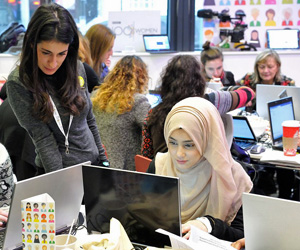
#100womenwiki events were held in BBC Broadcasting House in London plus BBC sites in Cardiff, Glasgow and Reading; while around the world, edit-a-thons took place in Cairo, Islamabad, Jerusalem, Kathmandu, Miami, Rio de Janeiro, Rome, Sao Paulo and Washington DC. The partnership resulted in hundreds of new contributors, thousands of new Wikipedia articles, and a huge amount of radio, television, online and print media coverage worldwide.
How Womanthology readers can help
I would encourage Womanthology readers to think about becoming a Wikipedia editor themselves. There are lots of tools to support new contributors and you can edit using the Visual Editor, which is very intuitive for anyone who has used Microsoft Word or similar programmes.
The best way to learn is by attending an event called an edit-a-thon where an experienced Wikipedia editor provides training. These are usually held at our partner institutions such as museums, libraries and universities and are often suitable for complete beginners. Upcoming events are listed online at https://wikimedia.org.uk/wiki/Events.
@Wikipedia is SO accessible when you’ve got expert guidance at @EdinburghUni from @wikimediauk & @emcandre. Use the visual editor! Play in the “sandbox”! EAT CARROT CAKE 😍#SkillsNSnacks #FCL18 #Vote100 #WomenInMedicine pic.twitter.com/SeG6CGDlic
— ZED Tupling (@ZEDTupling) February 22, 2018
Coming up
At a personal level, what’s coming up for me is a new baby, as I’m due to have my second child at the beginning of April!
At an organisational level there is also plenty to be excited about. I’m particularly looking forward to our collaboration with Amnesty coming to fruition with a series of national and international events in May and June this year.
Another exciting development is Wikimedia 2030, which is a global conversation to determine the future strategic direction of the Wikimedia open knowledge movement. Wikimedia UK has been involved in the process over the past 18 months and will support the next few years of transition, as the movement shifts its focus to knowledge as a service and knowledge equity.
This shift reflects our own strategy within the UK, which is underpinned by a strong social mission and a commitment to diversity and equality across all of our work. There’s much to be done but we’re ready!
https://twitter.com/wikimediauk
https://twitter.com/lcromptonreid

